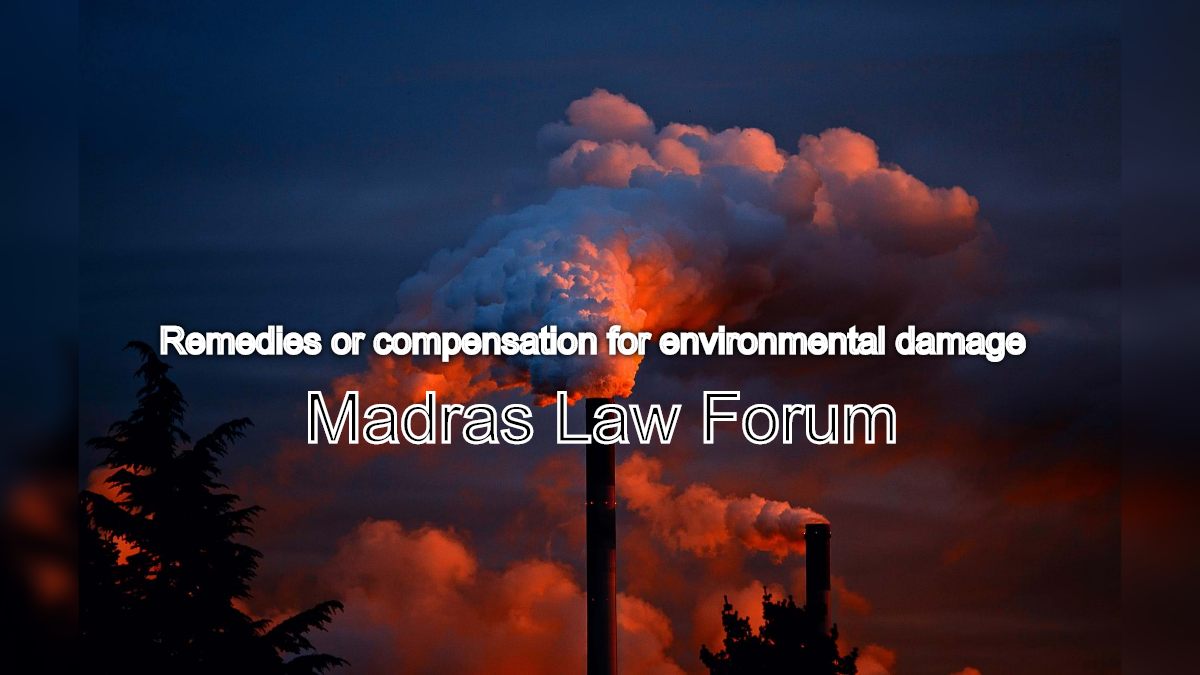Remedies or compensation: The rapid pace of industrialization and urbanization has undeniably brought immense progress, but it has also cast a long shadow on our environment. Pollution and environmental damage pose a significant threat to our health, well-being, and the delicate ecological balance. However, Indian law empowers individuals and communities to seek legal remedies and compensation for such damage. This article, brought to you by Madras Law Forum, a premier legal resource in Chennai, will guide you through the legal landscape in India and explore the avenues available for seeking redress for environmental wrongs.
Environmental Damage and the Law: Seeking Remedies in India
Understanding Environmental Damage and Legal Rights
Environmental damage encompasses a broad spectrum of issues, including air and water pollution, deforestation, soil degradation, and loss of biodiversity. These issues can have a devastating impact on human health, causing respiratory ailments, waterborne diseases, and a decline in overall quality of life. Furthermore, environmental damage disrupts ecosystems, jeopardizes the livelihoods of communities dependent on natural resources, and poses a threat to future generations.
The good news is that Indian law recognizes the fundamental right to a clean and healthy environment. This right is enshrined in Article 21 of the Constitution, which guarantees the right to life and personal liberty. Additionally, various environmental legislations empower individuals and communities to seek legal action against polluters and those responsible for environmental damage.
Legal Avenues for Seeking Remedies:
India boasts a robust legal framework for environmental protection. Here are some key avenues for seeking legal remedies:
- The National Green Tribunal (NGT): Established in 2010, the NGT is a specialized tribunal empowered to handle environmental disputes and enforce environmental laws. Individuals and communities can directly file complaints with the NGT, seeking compensation for environmental damage and requesting corrective action from polluters.
- Public Interest Litigation (PIL): PILs allow any person or group to approach the High Court or Supreme Court on behalf of the public interest. This is a powerful tool for seeking environmental justice, especially when the damage affects a large community or poses a significant ecological threat.
- Environmental Legislation: Specific environmental laws like the Water (Prevention and Control of Pollution) Act, 1974, and the Air (Prevention and Control of Pollution) Act, 1981, provide legal grounds for holding polluters accountable. These laws empower authorities to impose penalties and even order the closure of polluting industries.
Factors Influencing Legal Action:
The success of a legal case against environmental damage hinges on several factors. Strong evidence linking the polluter to the damage is crucial. This might involve scientific reports, environmental impact assessments, and witness testimonies. Additionally, demonstrating the extent of the damage and its impact on individuals or communities significantly strengthens the case. Finally, seeking legal assistance from experienced environmental lawyers is highly recommended. They can navigate the complexities of environmental law, prepare a strong case, and represent you effectively in court.
Frequently Asked Questions (FAQs):
Compensation can cover a wide range of aspects, including medical expenses for health problems caused by pollution, loss of income due to damaged natural resources, and the cost of restoring the environment.
The limitation period varies depending on the specific legislation invoked. Consulting a lawyer is essential to determine the applicable time frame.
Yes, legal action can be taken against the government if it fails to enforce environmental laws or implement adequate pollution control measures.
Gathering evidence, navigating the legal system, and the financial burden of litigation can be challenging. However, the potential benefits of securing environmental justice and protecting the environment often outweigh the difficulties.
Madras Law Forum provides access to a network of experienced environmental lawyers who can offer guidance, support, and representation throughout the legal process.
Conclusion:
Environmental damage is a serious concern, but Indian law provides avenues for individuals and communities to fight for a clean and healthy environment. By understanding your legal rights, exploring the available remedies, and seeking professional legal help, you can play a vital role in protecting the environment and ensuring a sustainable future for all.
Read More
- Criminal offenses recognized under Indian Law: How to Learn?
- Filing a Criminal Complaint FIR (First Information Report): Expert Advice
- What is administrative law in India? Expert Legal Remedies
- How Can I seek legal remedies for issues related to dowry harassment or cruelty? Expert Advice
- What is International Law and Its Relevance in India?
- National Green Tribunal (NGT):
